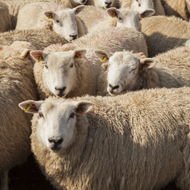Free trade deal could be 'catastrophic' for sheep farmers

The NSA says the consequences could be dire for the sheep sector, which is already suffering as a result of "unacceptably high levels" of lamb being imported from New Zealand.
A free trade deal with Australia could be "catastrophic" for the UK's sheep sector, according to the National Sheep Association (NSA).
The deal is said to have been proposed as part of trade negotiations to prepare for the UK's exit from the EU.
Australia's current quota allows it to export just under 20,000 tonnes of sheep meat to the EU, but the NSA says the country is keen to open up new trade deals and is 'seizing on Brexit' as a chance to renegotiate its quota.
There are hopes for a separate deal with the UK, which is viewed as a prime destination for Australian lamb and mutton.
Yet the NSA says the consequences could be dire for the sheep sector, which is already suffering as a result of "unacceptably high levels" of lamb being imported from New Zealand.
"A free trade deal with Australia or New Zealand may be beneficial for some UK industries but could have a catastrophic effect on UK sheep farmers and we cannot sit back and be sacrificed for the benefit of others," explained NSA chief executive Phil Stocker.
"Given the fundamental role our sheep sector has in maintaining the rural environment, landscape and community in the UK, we cannot afford to be overlooked in crucial trade negotiations.
"We encourage the UK Government to work hard on these deals, but not to rush into agreements without considering the wide consequences."
NSA wants to see more being done to grow the UK's domestic market and increase self-sufficiency, as well as tighter controls on imports of New Zealand lamb. Negotiating a trade deal with the EU post-Brexit should be a priority for the sector, Mr Stocker added.



 RCVS Knowledge has welcomed Professor Peter Cockcroft as editor-in-chief for Veterinary Evidence.
RCVS Knowledge has welcomed Professor Peter Cockcroft as editor-in-chief for Veterinary Evidence.